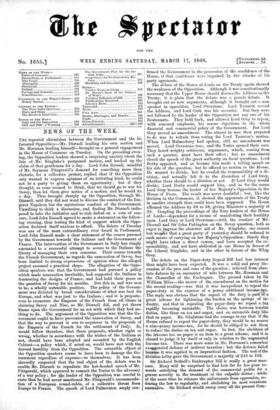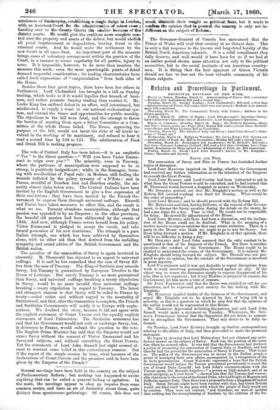NEWS OF THE WEEK.
firmed the Government in the possession of the confidence of the House, if that confidence were impaired by the attacks of his party opponents.
The debate of the House of Lords on the Treaty again showed the weakness of the Opposition. Although it was constitutionally necessary that the Upper House should discuss the Address on the Treaty, it is plain that the debate was a parade debate. It brought out no new arguments, although it brought out a new speaker in opposition, Lord Overstone. Lord Taunton moved the Address, and Lord Cork was his seconder. But they were not followed by the leader of the Opposition nor any one of his lieutenants. They held back, and allowed Lord Grey to repeat, with renewed emphasis, his severe objections to the whole financial and commercial policy of the Government. But Lord Grey moved no amendment. The utmost he was then prepared to do was to refrain from voting for Lord Taunton's motion.
When Lord Malmesbury had spoken, still no amendment was moved. Lord Overstone rose, and the Tories opened their ears. They heard weighty criticisms, arguments, which, coming from such a quarter, must have their effect ; but no amendment closed the speech of the great authority on fiscal questions. Lord Derby appeared, and as became him made a telling speech on his side of the question, but he offered no motion to the House. He wanted to divide, but he evaded the responsibility of a di- vision, and actually left it to the discretion of Lord Grey, whether there ehould be a division or not. If Lord Grey would divide, Lord Derby would support him, and so for the nonce Lord Grey became the leader of her Majesty's Opposition in the House of Peers. The result was never doubtful ; but, like the division in the Commons, it showed the opponents of the Treaty in smaller strength than could have been supposed. The House affirmed the Address by 68 to 38, giving Ministers a majority of 30. Coupling the proceedings of the Tory leaders of the House of Lords—dependent for a means of manifesting their hostility upon Lord Grey or Lord Overstone—with the conduct of Mr. Disraeli and Sir John Pakington on the Savoy question, both so eager to iaikpress the obstetric aid of Mr Kinglake, one cannot but Worpler that a great party of yesterday should be reduced to such means of carrying on her Majesty's Opposition. Surely they might have taken a direct course, and have accepted the re- sponsibility, and not have abdicated in one House in favour of the- Liberal Kinglake, and in the other in favour of the Whig Grey.
The debate on the Paper-duty Repeal Bill had less interest than might have been expected. It was a solid and prosy dis- cussion of the pros and cons of the question ; relieved from abso- lute dulness by an encounter of wits between Mr. Horsman and the Chancellor of the Exchequer. The ground taken by Sir William Miles—the mover of the amendment on the motion for the second reading—was that it was inexpedient to repeal the paper-duty at the expense of a penny additional income-tax. The reply was obvious that the repeal of the duty is parrot a great scheme for lightening the burden on the springs of in- dustry, and that in repealing the paper-duty we repeal a tax rapidly becoming untenable. The choice was between tenable duties, like those on tea and sugar, and an untenable duty like that on paper. Mr. Gladstone had the courage to say that if the House refused to repeal the paper-duty, they would be no nearer a nine-penny income-tax, for he should be obliged to ask them to reduce the duties on tea and sugar. In fact, the abolition of the irksome tax on paper is an item in a great scheme, and it is absurd to judge it by itself or only in relation to the augmented Income-tax. There was more sense in Mr. Horsman's somewhat exaggerated defence of indirect taxation ; but the defence failed because it was applied in an impractical fashion. The test of the division-lobby gave the Government a majority of 245 to 192.
Sir Richard Bethell's Bankruptcy Bill is really a great mea- sure. Many will be surprised to find how far he has gone to- wards satisfying the demand of the commercial public for a graver severity in the treatment .oft the culpable debtor ; while at the same time he releases the unfortunate from oppression, re- ducing the law to regularity, and abolishing its most vexatious anomalies. Sir Richard would sweep away all the present COM- missioners of Bankruptcy, establishing a single Judge in London, with an Assistant Court for the administration of minor cases ; handing over to the County Courts the smaller business of the district courts. He would give the creditors more complete con- trol over the property and assets of the debtor, but would abolish all penal imprisonment or degradation, leaving fraud to the criminal courts. And he would make the settlement by the new Court in all cases final: An important part of the measure brings cases of voluntary arrangement within the purview of the Court, in a manner to secure regularity for all parties, injury to none. It is impossible, however, to do more than mention the measure this week : even the more questionkble points of detail demand respectful consideration ; its leading characteristics have called forth expressions of " congratulation " from both sides of the House.
Besides these four great topics, there have been few others in Parliament. Lord Chelmsford has brought in a bill on Sunday trading, which looks as if it would legalize that branch of busi- ness, and rather promote Sunday trading than restrict it. Mr. Locke King has suffered defeat in. an effort, well intentioned, but misdirected, to supply a want in our national ecclesiastical sys- tem, and extend the times and opportunities for public worship. The objections to the bill were fatal, and the attempt to throw the burden of meeting them upon a Select Committee or a Com- mittee of the whole House failed. The House, approving the purpose of the bill, would not incur the risks of all kinds in- volved in the working of its machinery, and refused to hear it read a second time by 168 to 131. The adulteration of Food and Drink Bill is making progress.



























 Previous page
Previous page